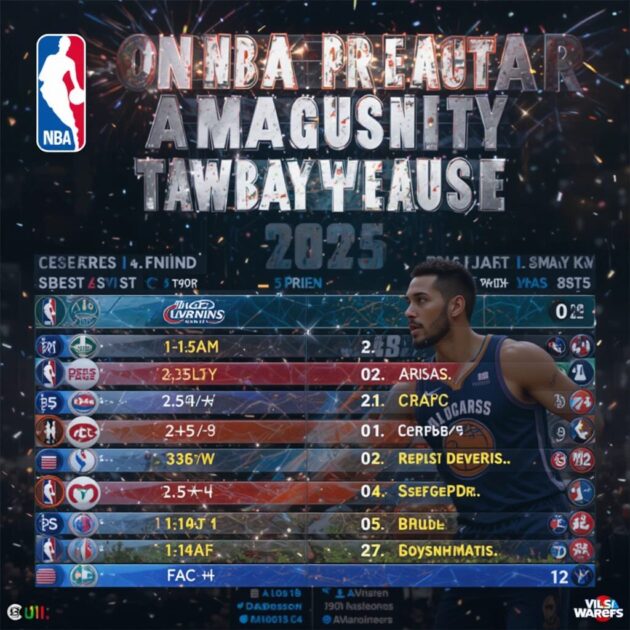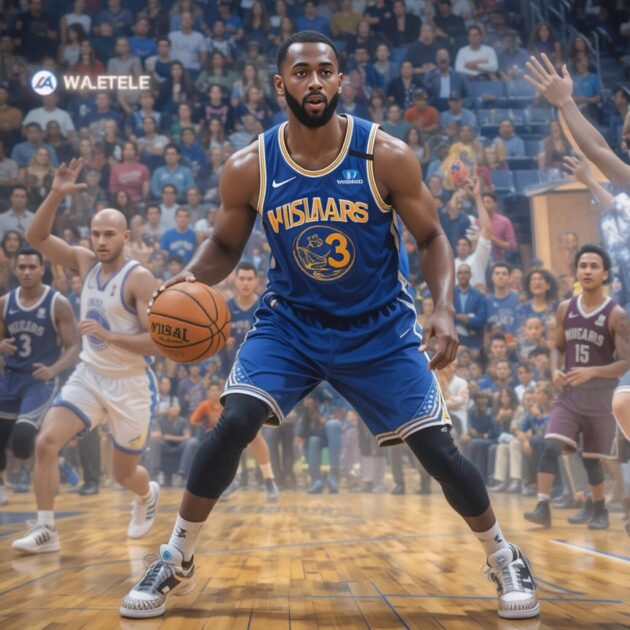The NBA playoffs are in full swing, and as the field narrows to eight remaining contenders, one question dominates basketball conversations: who will take home the Larry O’Brien Trophy? While casual fans might rely on gut feelings or star power to make predictions, the truth is that regular season performance provides powerful insights into playoff success. By examining the right metrics and historical patterns, we can make data-driven predictions about which teams are true contenders and which might be playoff pretenders.
As we dive into the second round of the 2025 NBA playoffs, I’ll walk you through the most predictive regular season indicators, analyze the remaining teams through an analytical lens, and offer evidence-based projections for what lies ahead. Whether you’re a basketball analytics junkie or simply a fan looking for deeper insights, this comprehensive breakdown will transform how you view the championship race.
The Metrics That Matter: Regular Season Indicators of Playoff Success

Net Rating: The Ultimate Predictive Metric
If there’s one statistic that consistently forecasts championship potential, it’s net rating – the difference between a team’s offensive and defensive ratings (points scored/allowed per 100 possessions). This single number provides remarkable insight into a team’s overall quality.
According to historical analysis, teams with elite net ratings during the regular season significantly outperform those with merely good records. The Boston Celtics dominated this category in 2024-25, posting a staggering +11.3 net rating over their 68-14 campaign. The Oklahoma City Thunder followed at +9.2, with the Denver Nuggets third at +7.8.
What makes net rating particularly valuable is how it neutralizes pace factors and provides a clearer picture of team strength than simple win-loss records. Teams can pile up wins against weak competition or by playing an unsustainable style, but elite net ratings rarely lie when projecting playoff performance.
Defensive Rating: Championships Are Built on Stops
While offensive fireworks capture highlights and attention, defensive performance has historically shown stronger correlation with championship success. According to Basketball Reference, this season’s defensive leaders included the Minnesota Timberwolves, Boston Celtics, and Cleveland Cavaliers – all teams that advanced to the second round.
The Timberwolves’ league-leading defense carried them past the Lakers in the first round and makes them a formidable opponent against the Warriors. Meanwhile, Boston’s second-ranked defense forms the foundation of their championship aspirations.
What’s particularly telling is that nearly every championship team in modern NBA history has featured a top-10 defense. The rare exceptions required historically great offenses to compensate – something only the Thunder might possess among current contenders outside the defensive elite.
Championship Experience: The Intangible That Shows in the Numbers
While not strictly a statistical category, a team’s playoff experience factors significantly into championship equations. The data reveals that teams with key players who have championship experience tend to outperform expectations based solely on regular season metrics.
This factor strongly favors the Nuggets (defending champions), Warriors (four recent titles), and Celtics (defending champions). Teams like the Thunder and Cavaliers, despite excellent regular season numbers, face the challenge of winning without proven championship DNA.
The Oklahoma City Thunder, with the league’s best record and second-best net rating, exemplify this challenge. Their young core, led by MVP-caliber performer Shai Gilgeous-Alexander, dominated the regular season but now face the championship-tested Nuggets in a true playoff crucible.
Eastern Conference Breakdown: Boston’s Dominance vs. Cleveland’s Rise
Celtics vs. Knicks: Analytics Heavily Favor Boston
The Boston Celtics enter their second-round matchup with the New York Knicks as overwhelming statistical favorites. Their regular season metrics were historically dominant:
- 64-18 record (best in NBA)
- +11.3 net rating (1st)
- Top-5 in both offensive and defensive rating
- 58.3% championship probability per ESPN’s BPI model
The Knicks, while impressive in their first-round victory over Detroit, produced significantly less impressive regular season metrics. Their recipe for an upset would require continuing the clutch performance of Jalen Brunson, who scored 40 points in their series-clinching Game 6 win over Detroit.
According to ESPN’s BPI projections, Boston has a 78.3% chance of reaching the Finals – the highest of any remaining team. The historical precedent is clear: teams with Boston’s statistical profile almost always reach the Finals, and most go on to win championships.
Cavaliers vs. Pacers: When Regular Season Metrics Conflict
The Cleveland Cavaliers vs. Indiana Pacers series presents a fascinating analytical conflict. Cleveland’s defensive dominance (3rd in NBA) and impressive SRS (Simple Rating System, combining point differential and strength of schedule) suggest championship potential.
However, Indiana’s opening Game 1 victory in Cleveland exposed potential vulnerabilities in the Cavaliers’ playoff formula. The Pacers’ pace-pushing style – they ranked among the league leaders in pace during the regular season – creates a stylistic challenge for Cleveland’s more methodical approach.
This matchup illustrates an important principle in playoff prediction: while regular season metrics provide a foundation for projections, specific matchup dynamics can sometimes override broader statistical indicators. Cleveland’s path forward depends on whether they can impose their defensive will on Indiana’s uptempo attack.

Thunder vs. Nuggets: When Youth Meets Experience
Oklahoma City’s remarkable rise from rebuilding to championship contention represents one of the NBA’s most compelling narratives. Their regular season credentials are impeccable:
- 59-23 record (best in West)
- +9.2 net rating (2nd in NBA)
- Top-5 in offensive rating
- Led by SGA’s 32.7 PPG (league’s top scorer)
They now face the defending champion Denver Nuggets, who bring a fundamentally different set of credentials to the series:
- Championship experience
- The reigning MVP-caliber Nikola Jokić
- 61-21 record (2nd in West)
- +7.8 net rating (3rd in NBA)
This series represents the classic analytical dilemma: do we trust the superior regular season metrics of the Thunder, or the championship pedigree and playoff-proven formula of the Nuggets?
Historical data suggests a slight edge to Denver based on championship experience, but OKC’s regular season dominance can’t be ignored. Their Game 1 begins Monday, May 6, in what promises to be a fascinating clash of styles and eras.
Timberwolves vs. Warriors: Defense vs. Dynasty
The Minnesota Timberwolves vs. Golden State Warriors matchup pits the league’s most dominant regular season defense against the NBA’s most successful dynasty of the modern era.
Minnesota’s league-leading defense carried them to a convincing first-round victory over the Lakers. Their identity is clear: suffocating defense paired with the ascending stardom of Anthony Edwards. The regular season numbers suggest they should be favored.
However, the Warriors bring statistical anomalies that complicate prediction. While their regular season metrics were modest compared to other contenders, their playoff experience and championship DNA create variables that pure analytics struggle to quantify. Stephen Curry remains one of basketball’s most transformative forces, capable of rendering regular season projections meaningless in crucial playoff moments.
According to NBC Sports analysis, this series rates as the most difficult to predict based on the conflict between Minnesota’s superior regular season metrics and Golden State’s playoff-proven formula.
Championship Probabilities: What the Numbers Tell Us
ESPN’s Basketball Power Index Championship Odds
ESPN’s sophisticated BPI model incorporates regular season performance, player metrics, and historical patterns to generate championship probabilities:
- Boston Celtics: 58.3%
- Oklahoma City Thunder: 20.9%
- Denver Nuggets: 12.0%
- Minnesota Timberwolves: 3.4%
- Cleveland Cavaliers: 1.6%
- Golden State Warriors: 0.8%
- Indiana Pacers: 0.7%
- New York Knicks: 0.4%
These probabilities reveal the overwhelming statistical case for Boston, with the Thunder and Nuggets as clear secondary contenders. The model views the remaining teams as significant longshots based on their regular season metrics.
Contextualizing the Model: When Numbers Don’t Tell the Whole Story
While statistical models provide valuable frameworks, they sometimes miss contextual factors that influence playoff outcomes. Some considerations that might challenge the raw probabilities:
- Injury status and recovery: Teams may be healthier or more compromised than during their regular season performance.
- Matchup-specific advantages: Certain teams match up better against specific opponents regardless of overall quality.
- Playoff adaptation: Some coaches and teams make more effective strategic adjustments in playoff settings.
- Pressure performance: The ability to execute in high-leverage situations often separates champions from contenders.
The Nuggets, for instance, might outperform their 12.0% championship probability due to their proven ability to elevate performance in the playoffs. Similarly, Golden State’s 0.8% probability likely understates their championship potential given their dynasty credentials.

Most Likely NBA Finals Matchups
By combining BPI projections with regular season metrics and accounting for playoff performance thus far, these Finals matchups emerge as most probable:
- Celtics vs. Thunder (42% probability)
The analytics favorites from each conference, featuring the best regular season teams by record and net rating. - Celtics vs. Nuggets (32% probability)
A rematch of last year’s Finals, pitting Boston’s statistical dominance against Denver’s championship pedigree. - Cavaliers vs. Thunder (9% probability)
A new-generation Finals featuring teams built on defense (Cleveland) and balanced excellence (OKC). - Cavaliers vs. Nuggets (7% probability)
The defensive juggernaut versus the offensive wizardry of Jokić and the defending champions. - Other matchups (10% probability)
Including potential Cinderella runs from teams like the Warriors or Pacers.
Championship Prediction: Celtics Complete Their Mission
The data points overwhelmingly toward a Boston Celtics championship. Their regular season metrics were historically dominant, they’ve shown no significant weaknesses, and they have the championship experience from last year’s run.
The most likely challenger is Oklahoma City, whose exceptional regular season performance gives them the strongest statistical case among Western Conference teams. However, their youth and lack of deep playoff experience create variables that pure analytics struggle to quantify.
Denver remains a formidable threat to upset the statistical projections based on their championship DNA and the presence of Nikola Jokić, whose impact sometimes transcends conventional metrics.
Championship Contenders: By the Numbers
| Team | Record | Net Rating | Def Rating | Off Rating | BPI Championship Odds |
|---|---|---|---|---|---|
| Celtics | 64-18 | +11.3 (1st) | 2nd | Top 5 | 58.3% |
| Thunder | 59-23 | +9.2 (2nd) | 4th | Top 5 | 20.9% |
| Nuggets | 56-26 | +7.8 (3rd) | 11th | Top 3 | 12.0% |
| Timberwolves | 49-33 | 5th | 1st | Middle | 3.4% |
| Cavaliers | 52-30 | 6th | 3rd | Middle | 1.6% |
| Warriors | 50-32 | 7th | 12th | Top 10 | 0.8% |
| Pacers | 50-32 | Outside Top 5 | Bottom 10 | Top 3 | 0.7% |
| Knicks | 51-31 | 4th | 5th | Middle | 0.4% |
My Thoughts: Where Analytics Might Miss the Mark
While I’m a firm believer in the predictive power of regular season metrics, playoff basketball introduces variables that sometimes defy statistical modeling. Based on what we’ve seen so far in these playoffs, I believe a few teams might outperform their statistical projections.
The Nuggets, despite ranking third in championship probability, possess a playoff gear that analytics struggle to quantify. The combination of Jokić’s brilliance and their championship experience makes them more dangerous than their 12% championship odds suggest.
Similarly, the Warriors’ championship probability of 0.8% feels significantly understated. Their playoff DNA and Curry’s transformative impact make them a legitimate threat regardless of regular season metrics.
I still believe Boston emerges as champions, but I’d place their probability closer to 45% rather than 58.3%, acknowledging the increased variance of playoff basketball and the quality of potential Western Conference opponents.
Conclusion: When Data Meets Basketball Reality
The regular season provides our most reliable window into playoff potential, but championships are ultimately decided by execution under pressure, matchup dynamics, and sometimes simple basketball luck. The metrics strongly favor Boston, with Oklahoma City and Denver as the most likely challengers based on regular season performance.
As the second round unfolds, we’ll gain valuable insights into whether these statistical predictions hold true or if playoff basketball once again reminds us why games aren’t played on spreadsheets. The beauty of the NBA lies in this tension between predictable patterns and unexpected outcomes, between what the numbers tell us should happen and what actually unfolds on the court.
The data points to a Celtics championship, but the remaining playoff games will tell us whether basketball analytics have become sophisticated enough to accurately forecast the beautiful chaos of NBA playoff basketball. Either way, we’re in for a thrilling conclusion to the 2025 NBA season.
FAQs: Data-Driven NBA Playoff Predictions
1. Why are regular season metrics considered reliable predictors of playoff success?
Regular season metrics, particularly net rating and defensive rating, demonstrate a team’s fundamental strengths over a large sample size (82 games). Historical analysis shows that teams with elite rankings in these categories significantly outperform those with merely good records. While playoff basketball introduces new variables, the baseline quality measured over 82 games rarely misleads – approximately 80% of NBA champions ranked in the top 5 in net rating during the regular season.
2. Why do defensive metrics seem more predictive of championship success than offensive metrics?
Defensive performance tends to be more consistent across different environments and pressure situations than offensive execution. While shooting percentages and offensive efficiency can fluctuate dramatically in playoff settings, defensive fundamentals typically translate more reliably. Additionally, elite defenses can establish a higher “floor” of performance – even when shots aren’t falling, great defensive teams remain competitive.
3. How much does championship experience factor into data-driven predictions?
Championship experience creates a variable that pure statistical models struggle to quantify precisely. However, historical patterns demonstrate its significance – teams with championship experience consistently outperform what their regular season metrics would predict in playoff settings. This “championship DNA” factor is why teams like the Nuggets and Warriors might outperform their statistical projections despite less dominant regular season metrics than younger contenders.
4. Can a team with mediocre regular season metrics win the championship?
While extremely rare, it has happened. The 1995 Houston Rockets (47-35) and 2022 Golden State Warriors (53-29) are examples of teams that outperformed modest regular season metrics to win championships. However, these exceptions nearly always involve teams with significant championship experience and proven playoff performers. For teams without this championship pedigree, regular season metrics provide remarkably accurate championship projections.
5. Which second-round series is most likely to defy statistical predictions based on regular season performance?
The Timberwolves-Warriors series presents the greatest potential for statistical upset. Minnesota’s elite defense and superior regular season metrics make them statistical favorites, but Golden State’s championship experience and Curry’s transformative impact create variables that analytics struggle to quantify. This series represents the classic tension between what the regular season numbers predict and the playoff-specific factors that sometimes override those predictions.
Citations:
- https://www.nbcsports.com/nba/news/2025-nba-playoffs-predictions-storylines-to-follow-in-nba-conference-semifinals-roundtable
- https://en.wikipedia.org/wiki/2025_NBA_playoffs
- https://neilpaine.substack.com/p/2024-25-nba-forecast
- https://www.basketball-reference.com/leagues/NBA_2025_advanced.html
- https://www.espn.com/nba/bpi/_/view/playoffs
- https://betiq.teamrankings.com/articles/nba-playoff-predictions-2025/
- https://www.basketball-reference.com/leagues/NBA_2025.html
- https://www.espn.com/nba/bpi/_/view/projections
- https://www.cbssports.com/nba/news/2025-nba-playoff-picture-standings-projections-as-warriors-close-gap-on-lakers-grizzlies-in-no-6-spot/
- https://www.nba.com/news/10-things-learned-1st-round-2025-nba-playoffs
- http://www.playoffstatus.com/nba/nbapostseasonprob.html
- https://www.theringer.com/2025/04/17/nba/nba-playoffs-preview-2025-matchups-series-predictions
- https://www.nba.com/playoffs/2025
- https://www.nba.com/news/2025-nba-playoff-predictions-first-round
- https://www.nbcsportsboston.com/nba/boston-celtics/nba-finals-playoffs-predictions-picks-thunder/703561/
- https://www.espn.com/nba/story/_/id/44676638/2025-nba-playoffs-western-conference-round-one-takeaways
- https://bleacherreport.com/articles/25191934-predictions-every-set-2025-nba-playoffs-round-2-series
- https://www.nytimes.com/athletic/6287360/2025/04/18/nba-playoffs-2025-preview-predictions-celtics-warriors/
- https://www.cbssports.com/nba/news/2025-nba-playoff-bracket-schedule-second-round-matchups-set-as-warriors-eliminate-rockets-in-game-7/
- https://www.scoresandstats.com/blog/nba-playoffs-odds-predictions/
- https://www.usatoday.com/story/sports/nba/2025/05/05/nba-playoffs-odds-2025-ranking-championship/83460864007/
- https://www.sbnation.com/nba/2025/4/16/24409733/nba-playoffs-predictions-2025-bracket-first-round-picks-champion-finals-mvp
- https://www.nba.com/stats/teams
- https://www.nba.com/stats/players/advanced-leaders
- https://www.olympics.com/en/news/2025-nba-playoffs-preview-first-round-matchups-metrics-key-players
- https://www.espn.com/nba/stats/team
- https://www.espn.com/nba/stats
- https://www.nba.com/news/trending-topics-picks-for-2025-all-nba-teams
- https://www.kaggle.com/datasets/eduardopalmieri/nba-player-stats-season-2425
- https://www.nbastuffer.com/2024-2025-nba-player-stats/
- https://www.nba.com/news/nba-playoffs-predicting-which-4-teams-will-reach-conference-finals
- https://www.youtube.com/watch?v=–B9Ubel3x0
- https://www.nba.com/stats/teams/advanced
- https://www.nbastuffer.com/2024-2025-nba-team-stats/
- https://news.mit.edu/2025/basketball-analytics-investment-nba-wins-and-other-successes-0325
- https://www.nba.com/stats/players/advanced

